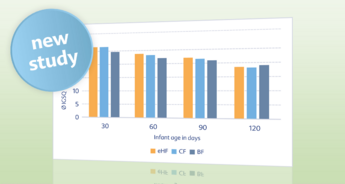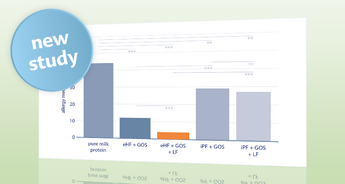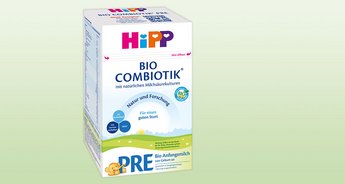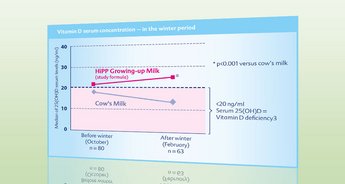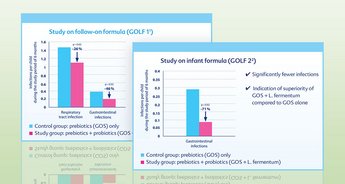Research on HiPP Milk Formulae
In this section, we present HiPP’s research on milk formulae. Here you can get comprehensive information on the research conducted on our formula products.
NEW study proves: HiPP ORGANIC COMBIOTIC® strengthens the gut-lung axis
Respiratory infections are among the most common diseases in infants. A new study provides further evidence of the positive effect of HiPP ORGANIC COMBIOTIC® on the intestinal microbiota and a resulting reduction in lower respiratory tract infections.
Clinical study confirms the good tolerability of HiPP COMBIOTIC® infant formulae
HiPP HA COMBIOTIC® (extensively hydrolysed formula with GOS and L. fermentum) as well as HiPP ORGANIC COMBIOTIC® (intact protein, GOS and L. fermentum) showed good tolerability similar to that of breastfed infants.
Current study provides evidence for the allergy-preventive effect of a hydrolysed infant formula
HiPP HA COMBIOTIC® (extensively hydrolysed formula with GOS and L. fermentum CECT 5716) has a very low allergenicity while preserving T-cell epitopes for possible tolerance induction.
HiPP COMBIOTIC® shows positive effects on gut microbiota profiles
New GOLF III study in the American Journal of Clinical Nutrition (AJCN) shows, a synbiotic infant formula fortified with GOS and Limosilactobacillus fermentum leads to similar intestinal parameters as in breastfed infants.
Meta-analysis confirms the positive effect of L. fermentum on gastrointestinal infections in infants
The probiotic strain Limosilactobacillus fermentum CECT 5716 occurs naturally in human milk. The authors of this paper systematically reviewed existing literature and meta-analysed it to assess the effect of early administration of formula fortified with this probiotic strain.
HiPP Probiotic is safe over the long term as well
Study confirms: The follow-up to the clinical study of infant formula confirms that formula with GOS and L. fermentum is safe over the long term as well.
Protein-reduced HiPP Pre Organic COMBIOTIC®: BeMIM study proves safety and suitability
New studies suggest that high protein intake in infants increases the risk of obesity later in life. HiPP has implemented these updated recommendations and now offers the protein-reduced infant formula HiPP Pre Organic COMBIOTIC®.
HiPP Growing-up milk improves vitamin D levels, even during the winter months
The study examines whether vitamin D enriched growing-up (junior) milk can better prevent the seasonal drop in vitamin D serum levels during the winter months in comparison with cow’s milk.
Safety and benefits of milk formula with GOS + L. fermentum
The two studies investigated the safety and effects of infant formula with pre- and probiotics. The combined administration of natural lactic acid culture and GOS proved safe and well-tolerated, additionally the incidence of gastrointestinal infections was clearly lowered.




